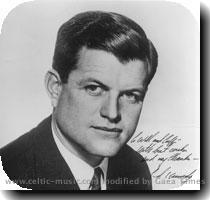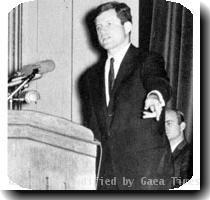Republican Scott Brown wins Massachusetts Senate seat held by Democrat Edward Kennedy
By APTuesday, January 19, 2010
Republican Brown wins Massachusetts Senate seat
BOSTON — Republican Scott Brown has won the Massachusetts Senate seat held for nearly a half-century by Democrat Edward Kennedy.
Brown’s victory in the special election gives Senate Republicans the 41st vote they need to block legislation favored by majority Democrats and President Barack Obama.
THIS IS A BREAKING NEWS UPDATE. Check back soon for further information. AP’s earlier story is below.
BOSTON (AP) — Striving for an epic upset in liberal Massachusetts, Republican Scott Brown pushed ahead of Democrat Martha Coakley on Tuesday in a U.S. Senate election that became a referendum on President Barack Obama’s health care overhaul and his first year.
A loss — or even a narrow victory — by the once-favored Coakley for the seat that the late Sen. Edward M. Kennedy held for nearly half a century in this Democratic stronghold could signal big political problems for the president’s party this fall when House, Senate and gubernatorial candidates are on the ballot nationwide.
More immediately at stake was a critical 60th vote for Democrats to save their health care legislation and the rest of Obama’s agenda. A 41st Republican in the 100-member Senate could allow the GOP to block the president’s priorities with filibusters.
With 60 percent of precincts reported, Brown held a steady lead over Coakley.
Turnout was expected to be twice as heavy as the light 20 percent of voters who participated in the December party primaries, despite a mix of snow and rain showers across the state virtually all day.
The election transformed reliably Democratic Massachusetts into a battleground state. One day shy of the first anniversary of Obama’s swearing-in, the election played out amid a backdrop of animosity and resentment from voters over persistently high unemployment, industry bailouts, exploding federal budget deficits and partisan wrangling over health care.
For weeks considered a long-shot, Brown rode that wave of bitterness to draw even with Coakley in the final stretch of the campaign. Surveys showed his candidacy energized Republicans, including backers of the grass-roots “tea party” movement, while attracting disappointed Democrats and independents uneasy with where they felt the nation was heading.
Though he wasn’t on the ballot, the president was on many voters’ minds.
“I voted for Obama because I wanted change. … I thought he’d bring it to us, but I just don’t like the direction that he’s heading,” said John Triolo, 38, a registered independent who voted in Fitchburg.
He said his frustrations, including what he considered the too-quick pace of health care legislation, led him to vote for Brown.
But Robert Hickman, 55, of New Bedford, said he backed Coakley “to stay on the same page with the president.”
Even before the first results were announced, administration officials were privately accusing Coakley of a poorly run campaign and playing down the notion that Obama or a toxic political landscape had much to do with the outcome.
Coakley’s supporters, in turn, blamed that very environment, saying her lead dropped significantly after the Senate passed health care reform shortly before Christmas and after the Christmas Day attempted airliner bombing that Obama himself said showed a failure of his administration.
Fingerpointing began more than a week ago as polls started showing a tight race. Obama flew to Boston for last-minute personal campaigning on Sunday.
White House spokesman Robert Gibbs said the president “was both surprised and frustrated … not pleased” at how competitive the race had become in the final weeks.
Wall Street watched the election closely. The Dow Jones industrial average rose 116 points, and analysts attributed the increase to hopes the election would make it harder for Obama to make his changes to health care. That eased investor concerns that profits at companies such as insurers and drug makers would suffer.
Across Massachusetts, voters who had been bombarded with phone calls and dizzied with nonstop campaign commercials for Coakley and Brown gave a fitting turnout despite intermittent snow and rain statewide.
Secretary of State William Galvin, who discounted sporadic reports of voter irregularities throughout the day, predicted turnout ranging from 1.6 million to 2.2 million, 40 percent to 55 percent of registered voters. The Dec. 8 primary had a scant turnout of about 20 percent.
Voters considered national issues including health care and the federal budget deficits.
“We don’t want health care just for the rich and the middle class. We need it for everyone,” said Democrat Neicei Degen, 82, who voted for Coakley in hopes of saving Obama’s plan that would extend coverage to millions of uninsured.
Fears about spending drove Karla Bunch, 49, to vote for Brown. “It’s time for the country, for the taxpayers, to take back their money,” she said.
For others, feelings about the candidates themselves shaped their votes.
Recalling that Brown once posed nude for Cosmopolitan magazine, Kaitlin Addams, 50, said she reluctantly voted for Coakley “to make sure the pinup boy doesn’t get into office. I don’t like his stand on issues. He’s an extreme conservative.”
Conversely, Elizabeth Reddin, 65, voted for Brown because she said she was turned off by the Democrat’s negative advertisements, saying: “The Coakley stuff was disgusting.”
As polls opened, Brown drove up to his polling place in Wrentham in the green pickup truck that came to symbolize his upstart, workmanlike campaign that in the past week pulled him into a surprise dead heat in polls.
“It would make everybody the 41st senator, and it would bring fairness and discussion back to the equation,” the state senator said of a potential victory. He spent the rest of the day out of public view, crafting evening rally remarks that had the potential to be an early State of the Union speech for the national Republican Party.
Coakley, stunned to see a double-digit lead evaporate in recent weeks, counted on labor unions and reawakened Democrats to turn out on her behalf and preserve a seat Kennedy and his brother, President John F. Kennedy, held for over 50 years. The senator died in August of brain cancer.
“We’re paying attention to the ground game,” Coakley, the state’s attorney general, said casting her vote in suburban Medford. “Every game has its own dynamics.”
Liz Sidoti reported from Washington. Associated Press writers Beth Fouhy, Bob Salsberg, Steve LeBlanc, Karen Testa, Kevin Vineys and Stephanie Reitz also contributed to this report.
Tags: Barack Obama, Boston, District Of Columbia, Edward Kennedy, Health Care Reform, Massachusetts, North America, Occasions, Parties, Political Issues, Senate Elections, United States

